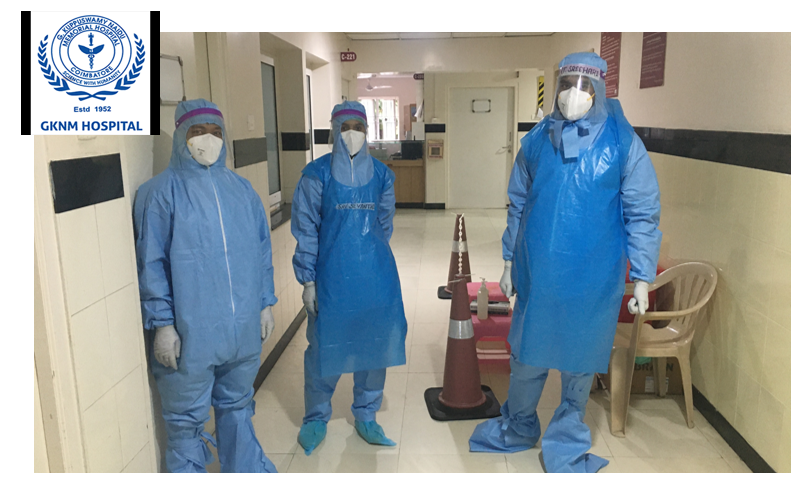Dr. Raju Vijayakumar (Dr. Vijay), a pediatric cardiac surgeon at G. Kuppusamy Naidu Memorial Hospital (GKNM) in Coimbatore, shares the challenges his hospital, cardiac program and patient families have faced during the pandemic and lockdown in India.
In India, the first COVID-19 case was reported on January 30th. The country has been under lockdown since March 24. Now, India is taking gradual steps towards loosening it. During the last few weeks, we didn’t have any new positive COVID-19 cases in Coimbatore. At the same time, everybody is still on alert, and the fear about COVID-19 remains.
Challenges to our hospital
The patient volume at GKNM has suddenly reduced to 10% of its original volume. The financial loss because of a reduced number of patients and less work has resulted in low morale for the staff. The hospital administration prepared for the pandemic by having separate isolation wards, training staff and procuring equipment. According to hospital policy, if someone among the health care workers tests positive with COVID-19, the entire facility would be shut down for 14 days.
Challenges to our cardiac pediatric program
We were allowed to perform only emergency surgeries until May 1st. From the beginning of the lockdown, we’ve operated on 21 children, which is 30% of our usual volume. More than 50% of the surgery patients were newborns with critical CHD and weighed less than 3 kilograms. COVID-19 testing is mandatory as a part of the hospital policy, and its results take around 10-12 hours. When the child is sick – on the ventilator, on inotropes or with borderline blood pressure – it brings up a lot of anxiety to my team and the parents. There is also a nursing challenge: 30% of nurses are unemployed because of less work, and among health care workers, there is also a fear of COVID-19 infection. Because of the lockdown, our nurses are not able to go home; moreover, they don’t have transport to get home. Our hospital provided the nurses with separate places for accommodation. There is also a challenge of using PPE in the summertime. It’s very hot, and it’s very difficult to wear the protective gear.
Challenges to our patients and families
Transport is the first challenge for families. Only a government ambulance is available, but its priority right now is transporting COVID-19 patients. It’s difficult to cross district borders, as we all need to get permits for that. Most of these children with critical heart disease who are being referred to me live 200-300 miles away from our hospital. There is no proper paramedical staff to accompany these sick children. The second challenge is the financial hardships that the families face. Most of them don’t have any income because of the lockdown. The government usually supports about 70% of our work, but now we are not allowed to do any surgeries under the government insurance plan. In addition, there’s an extra cost for the families because of the use of PPE by our staff and COVID-19 testing. We either have to depend entirely on NGOs like the Genesis Foundation (which was introduced to us by Children’s HeartLink) or private donors. The third challenge for families is finding a place to stay while their child is in the hospital. There are no hotels and no restaurants open due to the lockdown. Most families (except for a mother who is allowed to stay with the child) have to live literally on the streets.
Positive stories
Although this is a difficult time, we do have some positive stories to share.
We operated on a 3-month-old child who had a severe coronary anomaly. This girl was diagnosed by pediatric cardiologist Dr. Mani Ram Krishna from Amrita Institute of Medical Sciences, another Children’s HeartLink’s partner. This is a good example of the collaboration between Children’s HeartLink’s partner hospitals in India. It was a huge undertaking to get this child transferred 250 miles to my center. She was transported by Rotary ambulance, and the surgery was sponsored by the Genesis Foundation. The child is doing very well after surgery.
Another child was 1.6 kilograms, born pre-term, with a complicated heart block. The baby girl needed an epicardial pacemaker, and it was provided by Medtronic, free of charge. This patient was also referred by Dr. Mani Ram, and he also had to be transported over 250 miles to reach our center. The surgery took place on May 28th, and the patient is doing well.
Yet another example of collaboration within a Children’s HeartLink partner was for the sake of a baby born at 26 weeks with a large Patent Ductus Arteriosus (PDA). We did the PDA ligation. He was referred by Rabindranath Tagore International Institute of Cardiac Sciences, Kolkata.

The story from GKNM was reported by The Times of India
We also had a challenging case that was reported by The Times of India because this was the first surgery of its kind in India performed on a 2.2-kilogram child. The newborn was 8 days old and was diagnosed with Tetralogy of Fallot and type 1 valvular pulmonary artesia. This baby had a full heart repair and is doing well.
Children’s HeartLink’s Role
Our pediatric cardiac surgery program started in 2014, and we have been partnering with Children’s HeartLink since 2017. Because of ongoing issues with COVID-19, we are deprived of in-person contact with our volunteer teams and are relying more on Zoom and WhatsApp. Children’s HeartLink is in the process of organizing a series of online sessions with the Mayo Clinic team to train our nurses. I am in touch with the Mayo and Boston Children’s teams through WhatsApp and Zoom. I share my patient findings and get their opinions, which helps guide me during surgeries.
